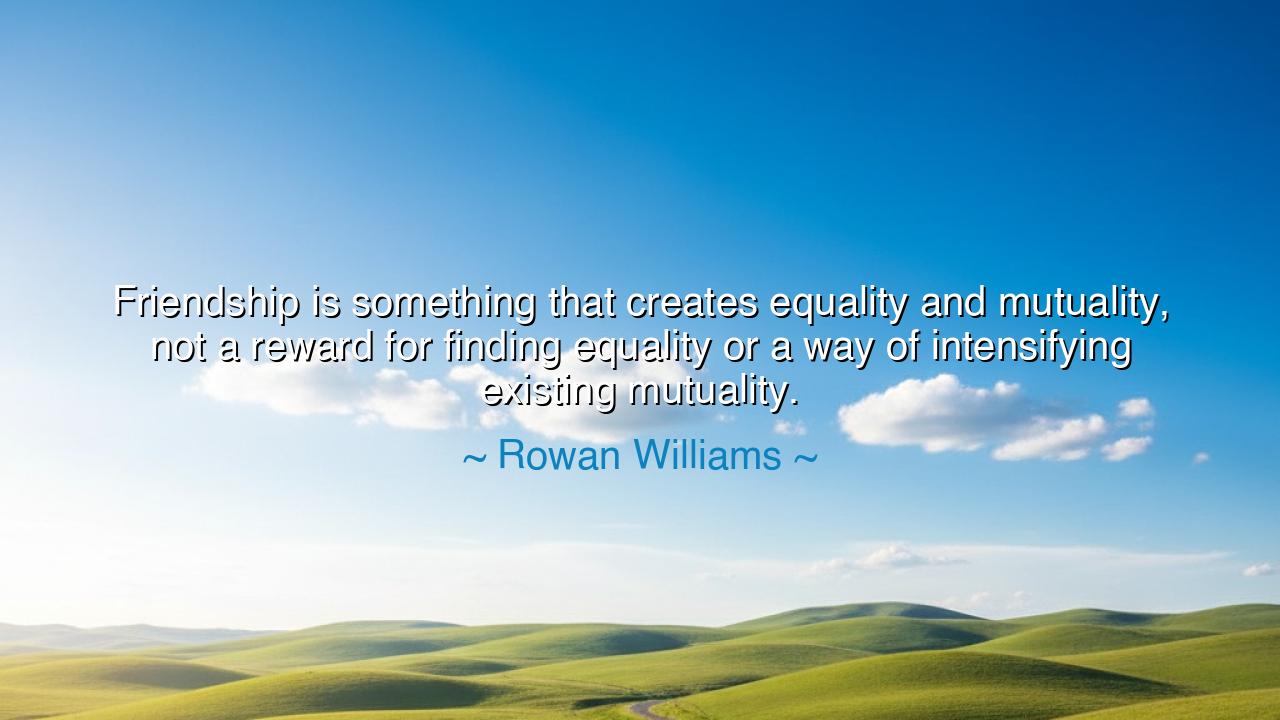
Friendship is something that creates equality and mutuality, not
Friendship is something that creates equality and mutuality, not a reward for finding equality or a way of intensifying existing mutuality.






"Friendship is something that creates equality and mutuality, not a reward for finding equality or a way of intensifying existing mutuality." — Rowan Williams
In the vast expanse of human relationships, where many bonds are formed out of convenience, circumstance, or shared experience, there exists a kind of bond more profound than most: friendship. Rowan Williams speaks of a friendship that is not the result of finding something already equal, nor a means of deepening a bond that is already mutual. Instead, it is a force that creates its own equality and mutuality, transforming two souls from separate beings into something greater than the sum of their parts. True friendship, as Williams suggests, does not arise because two people are already aligned, but because their connection forges a new path, one in which they stand as equals, not by virtue of similarity, but through the gift of the bond itself.
In the ancient world, the great philosophers understood this truth deeply. Aristotle, in his writings on friendship, spoke of three kinds of friendship: that of utility, that of pleasure, and the highest form—the friendship of the good. This highest form, he said, is not built upon mutual benefit, nor upon shared pleasure, but upon the recognition of virtue in one another. Here, in this friendship, two souls meet as equals not because they have similar interests or goals, but because they recognize the goodness within each other. This is the kind of equality that Williams speaks of—friendship that is not about finding common ground, but about the act of creating it through the shared recognition of each other’s worth.
Consider the example of David and Jonathan, two of the greatest figures of friendship in the ancient scriptures. Their bond, forged in the fires of loyalty and love, was not based on some existing similarity, nor was it an attempt to intensify mutual sympathy. Instead, their friendship created a space where each could stand as an equal, offering loyalty and love freely, without seeking anything in return. David, the future king, was already a figure of great potential, while Jonathan, the son of the king, was a prince in his own right. Yet in their friendship, they were equals, not because they shared status, but because their bond transcended rank and position. It was their commitment to one another, their willingness to stand by each other through trials, that forged a deeper, mutual equality.
The lesson here is not simply one of admiration for the relationship of David and Jonathan, but of understanding the nature of true friendship. Williams calls us to recognize that friendship is not a reward for finding equality, nor is it a way to intensify existing bonds. It is, instead, a transformative act. It is a process by which two people, through the gift of shared trust, respect, and support, create something new: a relationship where equality and mutuality are not assumed, but made. True friendship is not built on the easy foundations of similarity, but on the difficult yet noble effort to recognize the dignity and worth of the other, and to stand together, equally, in that recognition.
Look to the lives of the great leaders and thinkers, who often found their truest friendships not among those of their same rank, but among those who challenged them, who saw them not as they were, but as they could become. Socrates and his disciples, particularly Plato, were not equals by social or intellectual measure at first. Yet in their shared journey of seeking truth, they created a friendship where mutual respect and understanding flourished. Socrates did not form friendships based on existing mutuality, but through the act of questioning, of standing together in the search for wisdom. In doing so, they each became greater than they were individually, for their friendship created an equality that transcended their differences.
The essence of Williams’ wisdom, then, is this: friendship is a transformative force, one that reshapes the individuals involved. It is not a mere reward or a deepening of pre-existing ties, but a bond that creates a new equality between two people. To be friends is to be equal—not by external measures, but by the recognition of the other's humanity. True friendship calls us to stand together, not because we are alike, but because we are willing to see each other for who we truly are and offer our hearts freely, without expectation of gain.
In your own life, seek not friendships that flatter your ego, nor those that simply intensify existing affinities. Instead, seek out those who challenge you, who see you not as you are, but as you could be. Offer your friendship to those who will stand beside you not in your success, but in your struggles. Equality in friendship is not given—it is forged. Through mutual support, through shared experience, through the recognition of the other's worth, we create relationships that are true, transformative, and lasting. And in doing so, we find that in friendship, we are not simply two people together, but two people greater than we could ever be alone.






AAdministratorAdministrator
Welcome, honored guests. Please leave a comment, we will respond soon